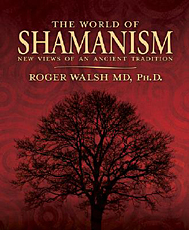"Two great mapping projects are underway, both of which could radically affect our future. One is well known and well funded, the other virtually unknown and unfunded. The first is the human genome project to map the genetic code. The other is the human consciousness project to map the varieties of consciousness. This project aims to map the range of states and stages of consciousness, its developmental pathways and potentials, the varieties of practices to heal and enhance it, its biological underpinnings, and its social-cultural correlates. We already have initial maps of states and stages, pathologies and therapies, as well as the central practices found among diverse spiritual traditions. Shamanic studies have crucial contributions to make, without which the project cannot be complete.
"Perhaps the most crucial finding of the human consciousness project is the recognition of the overlapping claims in diverse spiritual traditions about the unrecognized limitations of our usual waking state. According to contemplative traditions of both East and West, our usual waking state is distorted, constricted, and deluded, so that we live in what the East calls avidya, maya, or illusion. In the West this has been called a shared dream, a consensus trance, or a collective psychosis.
"Within our collective illusion we act blindly and all too often destructively, as might be expected of someone whose awareness is distorted and constricted. Our behavior is said to be driven by greed and fear in ways destructive to ourselves, our fellow beings, and our planet.
"But a few have awoken from this illusion, recognized their true nature, and then returned to point the way for the remainder of us. These are the spiritual heroes, the master game players, the great saints and sages, and those who escape from and then voluntarily return to Plato's cave. These are the people who have created and refreshed the world's spiritual traditions.
"The essence of their message is 'Wake up!' Awaken to your true nature, awaken to the fact you are not separate from anyone or anything, awaken to the fact that, as the Confucians say, 'Heaven, earth and the ten thousand things form one body.' Awaken to the recognition that, as one Zen master put it, 'You are more than this puny body or limited mind. Stated negatively, it is the realization that the universe is not external to you. Positively, it is experiencing the universe as yourself.'
"The person who awakens to this recognition is said to realize that 'the I, one's real, most intimate self, pervades the universe and all other beings.' These, of course, are expressions of the unio mystica so revered by contemplatives of all kinds.
"But such descriptions are not the exclusive province of mystics. They have been echoed by philosophers, psychologists, and physicists. 'Out of my experience. . .one final conclusion dogmatically emerges,' said Wi1liam James. 'There is a continuum of cosmic consciousness against which our individuality builds but accidental forces, and into which our several minds plunge as into a mother sea.' Albert Einstein made the point as beautifully and poetically as only a genius could:
" 'A human being is part of the whole called by us universe, a part limited in time and space. He experiences himself, his thoughts and feelings as something separated from the rest, a kind of optical delusion of his consciousness. This delusion is a kind of prison for us, restricting us to our personal desires and to affection for a few persons nearest to us. Our task must be to free ourselves from this prison by widening our circle of compassion to embrace all living creatures and the whole of nature in its beauty.'
"The practical implication of this realization is that when we realize that we are not separate from anyone or anything, we naturally want to treat them, quite literally, as our self. Hence, the biblical injunction to 'love thy neighbor as thy self,' to which Gandhi added, 'and every living being is thy neighbor.' In the words of the Buddha:
" 'See yourself in others.
Then whom can you hurt?
What harm can you do?'
"An ethic such as this, aimed at the welfare and awakening of all, may be crucial to the survival of our species and our planet."
